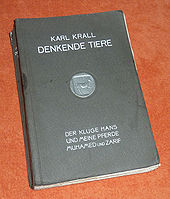Karl Krall
Karl Krall (born April 9, 1863 in Elberfeld , today Wuppertal , † January 12, 1929 in Munich ) was a German pioneer in animal psychology .
life and work
Krall came from a family of jewelers. He enjoyed the school education in Schulpforta , became a jeweler in Elberfeld and came into contact with the animal psychologist and private scholar Wilhelm von Osten .
After the previous owner's death in 1909, Krall inherited Klugen Hans, famous as the “thinking horse”, and continued the experiments with which Wilhelm von Osten had started to prove that animals are endowed with intelligence and an ego-consciousness. In addition to Hans, eleven other horses, two donkeys, a pony and an elephant served as experimental animals from 1908 onwards. Among them were the stallions Muhamed, who was said to be able to solve complex arithmetic problems, and Zarif, who was certified as having an unusual talent for reading. The blind stallion Berto and the Shetland dog are also known by name.
In addition, Krall was in correspondence with numerous people who owned or trained animals with exceptional abilities. In 1912 he published his extensive book Thinking Animals , which was reviewed by Franz Lütgenau among others , but no longer met with great interest from the readership. The public attention for the clever Hans had already subsided after Hans' numeracy and reading abilities had been refuted by Oskar Pfungst , although capacities such as Édouard Claparède , the psychiatrist Gustav Wolff , Paul Sarasin and zoologists such as Ludwig Plate and Heinrich Ernst Ziegler differed Krall's meticulously recorded observations were convincing. Even Maurice Maeterlinck visited the stables a visit and was amazed at the computational performance of the animals and their alleged ability to communicate with knocks.
However, Krall was journal animal soul unsuccessful and in 1916 he gave up trying to stall. His horses, including the once famous Kluge Hans, were used for military service; nothing is known about their further fate.
In 1925 Krall moved to Munich and worked there with occultism .
In 1923 Otto Dix created the portrait of the jeweler Karl Krall, which was later regarded as degenerate art and which now hangs in the Von-der-Heydt-Museum in Wuppertal-Elberfeld. This painting does not represent the jeweler and animal psychologist Karl Krall, but his son of the same name, the jeweler and art collector Karl Krall the Elder. J. (* July 8, 1893 in Elberfeld ; † November 25, 1938 ).
Karl Krall's estate is in the Psychology History Research Archive (PGFA) of the Distance University in Hagen.
Publications
- Thinking animals. Contributions to animal soul science based on own experiments. The clever Hans and my horses Muhamed and Zarif. Engelmann, Leipzig 1912
- About involuntary whispers. A critical and experimental review of the Hansen-Lehmann experiments. O. Mutze, Leipzig 1926
literature
- Wuppertal biographies. 2nd episode (= contributions to the history of the Wuppertal. 5). Wuppertal 1960.
- John Michell & Robert JM Rickard: Living Wonders: Mysteries and Curiosities of the Animal World. Thames and Hudson, 1982.
- The calculating horse from Elberfeld and other puzzles from the world of animals. Econ, Düsseldorf 1983, ISBN 3-430-16676-4 .
- Andreas W. Daum : Science popularization in the 19th century. Civil culture, scientific education and the German public 1848–1914 . 2nd, supplementary edition, Oldenbourg, Munich 2002, ISBN 978-3-486-56551-5 .
Web links
- Elberfeld Horses in Occultism & Parapsychology Encyclopedia on answers.com, 2001
Footnotes
- ↑ a b Gerhart Werner: Karl Krall. In: Wuppertal biographies. Volume 2. Wuppertal 1960 (also in: German Biographical Archive (DBA). NF 751, pp. 39–49)
- ^ Andreas W. Daum: Science popularization in the 19th century. Civil culture, scientific education and the German public 1848–1914 . Oldenbourg, Munich 2002, p. 433 f., 497 .
- ↑ tierdach.de: Famous horses that have lived: Elberfeld horses - calculating horses
- ^ Franz Lütgenau: Karl Krall. Thinking animals. (Review) In: Westfälisches Magazin. Volume 2, 1911, No. 18f .; Volume 3, 1912
- ↑ Reto U. Schneider : The experiment: The horse whisperer . In: NZZ Folio . November 2004
- ^ Maurice Maeterlinck: The strange guest. Diederichs, Jena 1919, Chapter 4 (English translation: The Elberfeld Horses )
- ↑ Richard David Precht : Animals: Cozy, cave, goodbye . In: The time . No. 20, May 11, 2005
- ↑ John Nicholls: Karl Krall. In: The Expressionist Impulse. Masterpieces from Wuppertal's large private collections. Wuppertal 2008, pp. 123/124
| personal data | |
|---|---|
| SURNAME | Krall, Karl |
| BRIEF DESCRIPTION | German animal researcher |
| DATE OF BIRTH | April 9, 1863 |
| PLACE OF BIRTH | Elberfeld |
| DATE OF DEATH | January 12, 1929 |
| Place of death | Munich |


